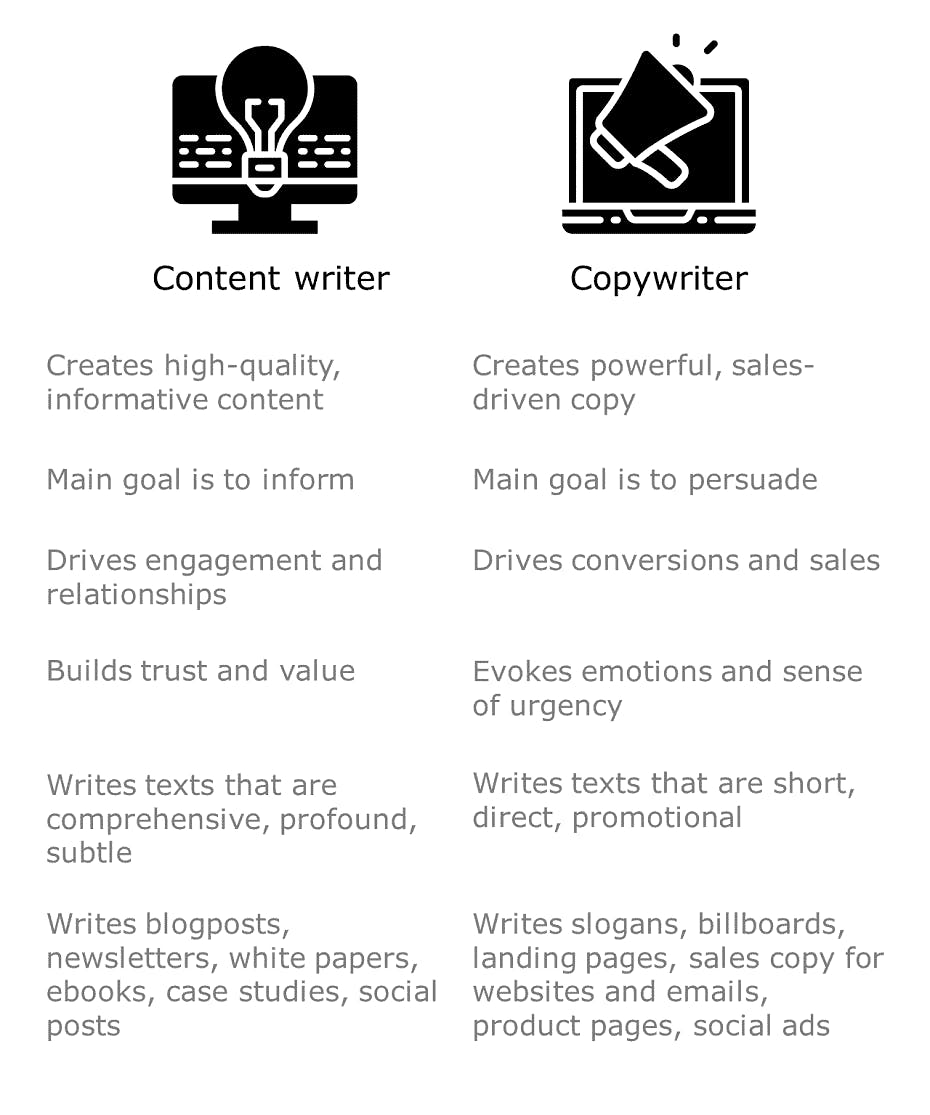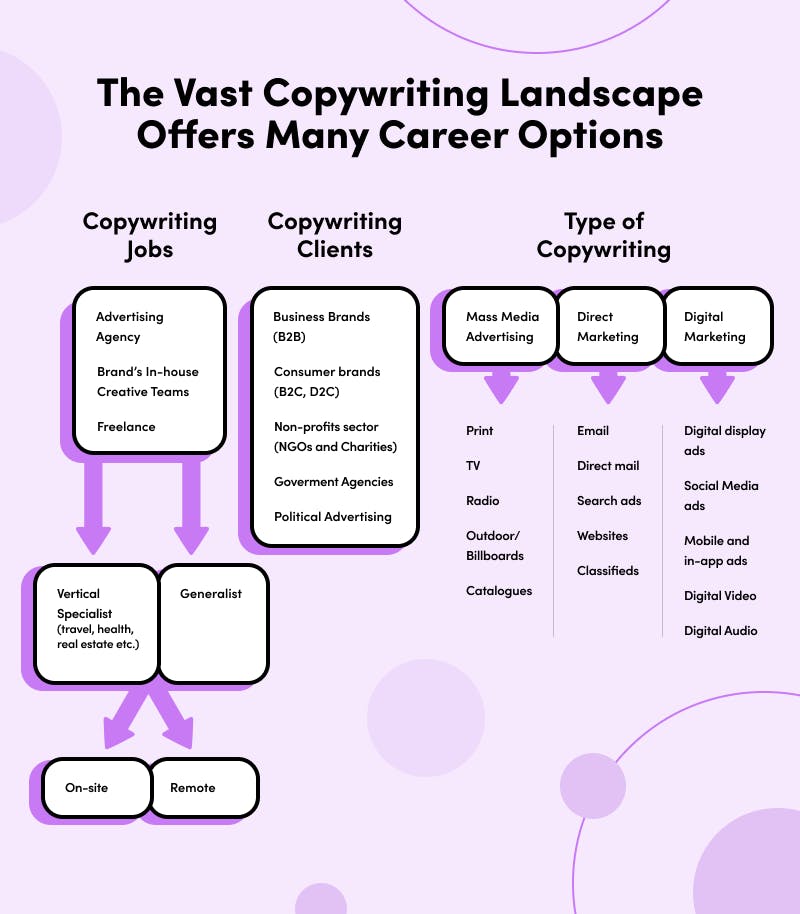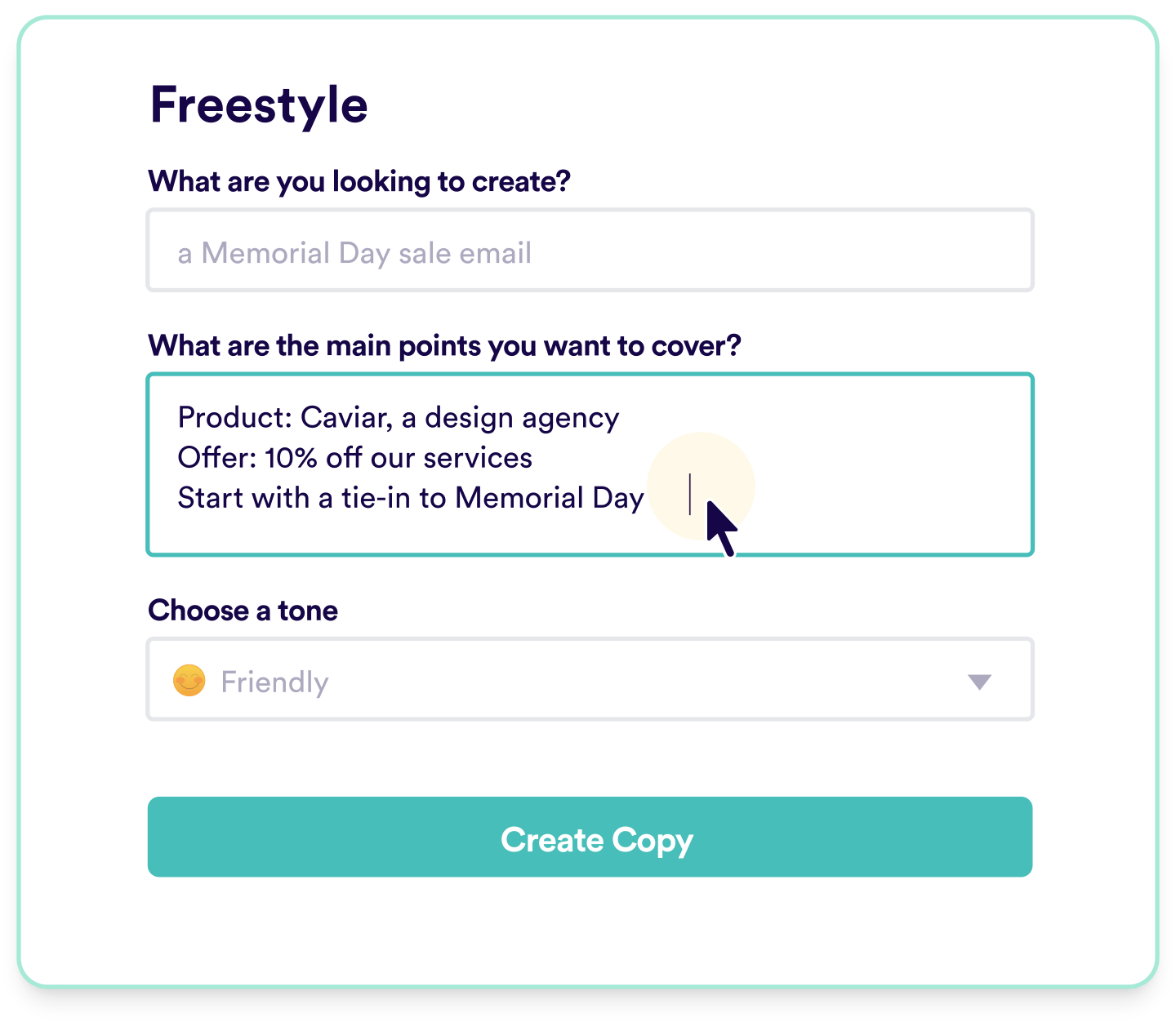What is a copywriter and what do they do?
Sep 12th, 2023

Copywriters play a crucial role in businesses by effectively communicating the value of products or services to potential customers. They possess a deep knowledge of consumer psychology and employ persuasive techniques to influence customer behavior. By using language that appeals to emotions, addresses pain points, and highlights the benefits of a product or service, copywriters can effectively communicate the value proposition and create a strong connection between the brand and the consumer.
Moreover, they are skilled in creating content tailored to specific platforms, such as websites, social media, emails, and advertisements. Copywriters understand the nuances of each channel and adapt their writing style accordingly, ensuring maximum impact and engagement. By crafting compelling copy, copywriters contribute significantly to enhancing brand awareness, driving conversions, and ultimately increasing business revenue.
This article will consider the copywriter’s role, work, and responsibilities and explain how to hire a copywriter for your team. In addition, we will address AI copywriting and ChatGPT and discuss whether it can replace copywriting done by an experienced writer.
What is a copywriter?
Copywriter is a professional writer responsible for creating engaging and effective advertising content for websites, blogs, landing pages, emails, and other online platforms to persuade, inform, or entertain the audience. They are adept at crafting compelling messages that effectively communicate the client's brand, products, or services. Their main objective is to engage the target audience, evoke emotions, and drive desired actions, such as making a purchase or subscribing to a service.

Copywriters play a crucial role in content marketing and advertising campaigns, as they are responsible for developing slogans, taglines, website copy, social media posts, brochures, and other promotional materials. A successful copywriter possesses a unique blend of creativity and strategic thinking. They carefully analyze the target market, demographics, preferences, and motivations to effectively tailor their message to customer needs. Furthermore, copywriters must thoroughly understand the client's brand voice and values, ensuring consistency in all written materials.
Excellent communication and writing skills are essential for copywriters, who must convey complex information clearly and concisely while maintaining a persuasive tone. Whether it's creating captivating headlines, engaging product descriptions, or memorable advertising campaigns, copywriters are integral to the success of marketing efforts by transforming ideas into powerful words that resonate with the target audience.
What does a copywriter do?
Writing good copy involves conducting research, collaborating with product and marketing teams, proofreading publications, and analyzing industry trends. Let us examine copywriters’ typical responsibilities and skills in more depth.
Research and analysis
Before creating a copy, a copywriter should research the topic or gather the necessary information about a product or service they are writing about. This includes understanding the intended users of the product and learning about the target audience’s needs and pain points. Copywriters should analyze the rivals’ publications to ensure their copy grabs customers’ attention.
Research may involve product testing, meeting clients, and experimenting with emerging trends. The research process greatly depends on the topic and the purpose of the copy. In some cases, research requires reading a few articles. However, in other situations, a copywriter should conduct interviews or find relevant literature on library shelves or specialized websites.
Adhering to brand guidelines and voice
Once a copywriter completes the research, the next step is to develop a concept for the text. At this stage, a copywriter decides what tone, style, and messaging will be most suitable for a target audience.
Copywriters are responsible for maintaining brand consistency across all marketing materials. They must adhere to brand guidelines to ensure the copy aligns with the company's brand identity. Consistency in brand communication helps build a strong connection with the audience, reinforcing the brand's image and values.
Collaborating with other team members
A specialist collaborates with editors, account managers, and creative directors to come up with a concept, brainstorm ideas, and articulate a clear message. Collaboration is essential to ensure the copy aligns with the visual elements and overall marketing strategy. By effectively communicating with team members, copywriters can create cohesive campaigns that effectively convey the intended message.
Adapting to different platforms and formats
Copywriters must adapt their writing style to different platforms and types of content marketing. Whether it's writing for social media posts, website copy, press releases, email newsletters, or print advertisements, they need to understand the features and requirements of each medium. This flexibility ensures maximum impact across various channels.

Writing compelling and persuasive copy
When the concept is approved, a copywriter starts writing a sales-oriented copy. One of the copywriter’s primary responsibilities is to create engaging and persuasive content that captures the attention of the target audience. It involves understanding the client's objectives, researching the target market, and crafting compelling messages.
Whether writing catchy headlines, attention-grabbing taglines, or persuasive product descriptions, the copywriter plays a crucial role in influencing consumer behavior through their words. To verify that the result fulfills the brand’s objectives, copywriters should also request feedback and revise their work. Before getting too far, they typically send the first draft to check if they are moving in the right direction.
Editing and proofreading
Ensuring accuracy and clarity is a critical responsibility of copywriters. They must meticulously proofread and edit their work, checking for grammar, spelling, punctuation, and formatting errors. By maintaining high writing standards and attention to detail, copywriters can deliver content that enhances the professionalism and credibility of the brand.
While copywriters may develop concepts and propose fresh ideas, they must also make changes in response to suggestions from clients and employers. Rewrites range from revising a few lines of content to beginning from scratch. Therefore, copywriters should possess excellent knowledge of grammar, spelling, and punctuation and an understanding of text processing and editing software.
Analyzing and optimizing copy performance
Copywriters are typically involved in analyzing the performance of their content and optimizing it for better results. They may examine click-through rates, conversion rates, and engagement levels to assess the effectiveness of their copy. Based on these insights, copywriters can make data-driven decisions and refine their writing strategies to improve campaign performance and achieve desired outcomes.
Continually monitoring industry trends
Copywriters must keep up with the most recent trends and industry best practices since the field of copywriting is constantly evolving. It includes participating in industry-related events, reading relevant publications, and networking with other experts.
By staying informed about industry trends, copywriters can align their work with the current clients’ needs and expectations. Monitoring trends exposes copywriters to innovative campaigns, compelling storytelling approaches, and fresh perspectives. Understanding the latest marketing techniques enables copywriters to produce content that effectively communicates the brand’s message.
Now that you are familiar with the principal copywriter’s responsibilities and skills, let us review what you should pay attention to when hiring a copywriter.
How to hire a copywriter?
We will provide some practical advice on hiring the best copywriter for your business that can help you reach your objectives.
Analyze your goals
Before hiring a copywriter, consider your requirements to decide whether a full-time or freelance copywriter would be the best fit for your company. To effectively brand your business, a full-time copywriter can produce consistent content that aligns with your company's voice. In contrast, you can hire a freelancer to create your marketing content if you don’t have a full-time workload.
Furthermore, there are different types of copywriting: website copywriting, SEO copywriting, product copywriting, B2B and B2C copywriting, social media copywriting, direct response copywriting, ad copywriting, and creative copywriting. When preparing a job description, consider the type of copywriting that addresses your goals, the niche that the copywriter specializes in, your audience’s needs, and the purpose of the copy.

Write a detailed job description
Finding excellent candidates requires writing a detailed description. It should contain an overview of the position, a thorough list of responsibilities, day-to-day tasks, and necessary skills. These might include the ability to create relatable and compelling content for different audiences, logical thinking, persuasion, originality, time management, research skills, marketing knowledge, and attention to detail.
Moreover, you can add several keywords to increase the visibility of your job posting. According to Indeed, the most popular keywords are the following: copywriter, content writer, writer, remote copywriter, creative writer, marketing, journalism, and writing.
Review copywriters’ portfolios
Ask for writing samples or portfolios to get a sense of the candidates’ quality of work and writing style. By examining copywriting examples from the writer’s portfolio, you will understand whether a person would be a good fit for this position. Pay attention to the topics of their previous texts to determine whether a copywriter has experience in your industry and possesses a command of appropriate terminology.
In addition, check a candidate’s profile on LinkedIn, look for reviews and testimonials from previous clients, and examine whether they have certifications in SEO, editing, journalism, or other relevant fields. You can also ask for references from previous employees or schedule a discovery call to understand whether you are on the same page regarding expectations and project deliverables.
Offer a test task
A test task allows you to assess the skills and capabilities of potential candidates practically and objectively. It goes beyond simply reviewing resumes and portfolios, providing you with valuable insights into a copywriter's ability to craft engaging content that aligns with your brand's tone and objectives. By assigning a test task, you can evaluate a copywriter's proficiency in various areas, such as their command of language, grammar, creativity, and understanding of target audiences.
This approach enables you to analyze their writing style and ability to adapt their tone and voice to suit different projects and brand personalities. Furthermore, it allows candidates to showcase their talents and demonstrate their commitment to delivering high-quality work. Ultimately, a well-designed test task ensures that you make an informed decision and select a copywriter who not only possesses the necessary skills but also fits seamlessly into your organization.
Hold an interview
Once you have selected some candidates based on their background, skills, and portfolio, you can conduct an interview to understand how a person approaches their job and performs research to create unique content. Strong applicants for copywriting roles will feel comfortable responding to questions about the copy concepts they included in their portfolio and a proactive approach to meeting deadlines.
Learn more about a candidate’s writing process and the sources they use to conduct research. Ask them how they would approach writing copy regarding a subject or industry that a person is unfamiliar with. Examine how candidates react to feedback and analyze their willingness to ask clarifying questions. In addition, pay attention to their enthusiasm and passion for their work.
Make a decision
After you have conducted research, reviewed portfolios, and talked to copywriters, it is time to choose the best candidate for this role. Choose a copywriter with the experience and skills to deliver quality content that generates results for your brand.
Hiring a copywriter is a vital step in accomplishing your marketing goals. By following the above-mentioned steps, you can identify and employ a copywriter who has the knowledge and expertise required to produce engaging content that connects with your audience and drives conversions.
AI copywriting
While artificial intelligence and language models like ChatGPT can generate text and provide creative suggestions, they cannot completely replace professional copywriters in the future. Here is why.
Human creativity and intuition. Copywriting requires a deep understanding of human emotions, cultural nuances, marketing strategies, and context. Professional copywriters possess a unique ability to tap into their creativity and intuition to create content that resonates with the target audience. They can infuse a personal touch and storytelling elements that AI algorithms may struggle to replicate.

Adaptability and originality. Copywriters may provide a fresh perspective and adapt their work to changing trends and client requirements. They can think outside the box and use innovative solutions when producing content. AI models are limited to what they have been trained on and may struggle with generating original ideas or adapting to specific client needs.
Collaboration and client understanding. Professional copywriters often work closely with clients, digital marketers, and other team members to understand the brand, target audience, and marketing goals. They engage in direct communication, provide feedback, and refine their work based on specific project requirements. This level of collaboration and human interaction is difficult for AI models to replicate.
Research and strategy. Copywriters conduct thorough market research to understand the target audience, competitors, and industry trends. They develop strategic messaging and positioning to differentiate brands and capture attention. Additionally, copywriters often collaborate with designers, marketers, content strategists, and clients to align the copy with visual elements, brand guidelines, and overall campaign objectives. While AI can assist with certain aspects of these tasks, such as data analysis or generating text variations, it cannot replicate the comprehensive approach and human touch that copywriters bring to the table.
Continuous learning. The field is dynamic, with trends and consumer preferences constantly evolving. Copywriters stay up to date with the latest developments and adapt their writing style and techniques accordingly. AI and Chat GPT, while capable of learning from vast amounts of data, so far haven’t proven to be able to keep up with real-time changes, in-depth understanding, and the necessary adjustments. They rely on pre-existing patterns and may struggle to generate creative copy that keeps up with the ever-changing landscape of the latest news and cultural trends.
To grow a business, you need to focus on creating informative and relevant content that drives sales. Copywriting encourages your audience to purchase your products or services, sign up for your channel, or take another action. You can entrust this task to a professional writer who knows how to create compelling sentences for your audience. Although anyone can write, not everyone can make people feel understood and demonstrate that your business cares about helping them.
